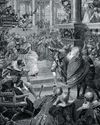
It’s an ill wind… Temporarily prevented from performing in Verbier by tendonitis in his left shoulder, Evgeny Kissin suddenly has time on his hands and is in a mood, I’m told, to give an interview. So I jump straight in, because this is a man who normally does his best to avoid giving any interviews at all. What has triggered this volte-face?
I get the answer before I’ve had the chance to ask my first question, as he launches into a diatribe, eyes blazing with fury: ‘We’re here in Switzerland, and this morning I read that this beautiful country has refused to treat wounded Ukrainian soldiers, citing its traditional neutrality.’
A few hours later it emerges that Switzerland will row back on that prohibition, but Kissin’s rage encompasses all democratic countries which don’t put their shoulder to the wheel in the Ukraine war. He very much approves of Britain’s support for Zelensky, but thinks Britain should press on militarily even harder, until Ukraine wins the war and Putin is defeated.
He then offers a detailed catalogue of Putin’s crimes, from turning Russia back into a totalitarian state to his nonsensical assertion that Ukraine’s government is undemocratic, and to his claim that that country is a hotbed of Nazism. ‘Yet since the end of the Gorbachev period,’ says Kissin, ‘Russia has literally been teeming with fascist organisations and publications. And although the Russian criminal code states that igniting ethnic, racial or religious hatred is punishable by law, no one has been punished.’ Putin’s propaganda, he adds, ‘involves lying in a special way, best expressed in the Russian saying that the thief shouts “stop thief” more loudly than anybody else.’
この記事は BBC Music Magazine の October 2022 版に掲載されています。
7 日間の Magzter GOLD 無料トライアルを開始して、何千もの厳選されたプレミアム ストーリー、9,000 以上の雑誌や新聞にアクセスしてください。
すでに購読者です ? サインイン
この記事は BBC Music Magazine の October 2022 版に掲載されています。
7 日間の Magzter GOLD 無料トライアルを開始して、何千もの厳選されたプレミアム ストーリー、9,000 以上の雑誌や新聞にアクセスしてください。
すでに購読者です? サインイン

A way with words
Great operas are inextricably linked with their composer but, asks Jessica Duchen, how often do we acknowledge the important role of the librettist?

THE MAGNIFICENT SEVEN Pick a theme... and name your seven favourite examples
Conductor Domingo Hindoyan nominates the best musical depictions of anger and frustration
A glittering beacon
Until its destruction in the fire of 1936, the Crystal Palace was one of the world's most exciting music venues, and its legacy still lives on today, writes Tom Service.

Christoph Willibald Gluck
Paul Riley traces the wandering existence of a cosmopolitan composer who made it his life's work and ambition to rip up opera's rulebook

The Awards are upon us once more!
Time to vote for the best recordings of the last 12 months

LEADING FROM THE FRONT
From running efficient rehearsals to learning to speak to orchestras with clarity and empathy, an array of exciting courses for conductors has bloomed in recent years, finds Clare Stevens

Kindred spirits
As their second opera takes to the stage, composer Gregory Spears and librettist Tracy K Smith talk to Charlotte Smith about their special partnership

The censors' refusal to play ball drives Verdi to despair
In the early months of 1857, Verdi had Shakespeare on his mind, and specifically King Lear.

11 Bed-Hopping Composers
Jeremy Pound lifts the covers off those notorious notesmiths who found the thrill of playing away simply too hard to resist

André Rieu Violinist, Conductor
King of the Waltz, Dutch musical impresario André Rieu has taken the world by storm with his Johann Strauss Orchestra.